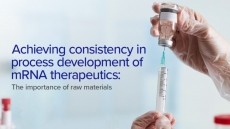Pfizer, Merck and J&J discuss differing biosimilar strategies

“The only thing that is certain about biosimilars is that they will come sooner or later,” former senior director at Baxter Michael Teasdale told delegates during a panel discussion on biosimilars at WTG's Biological Production Forum in Dublin, Ireland last month.
This idea was supported by comments from Charbel Tengroth, Pfizer senior process development manager, who told attendees for its biosimilars programme the firm is trying “to increase the chance of [development] success and bring the cost down” by using the teams and platforms it employs when developing branded biologics.
“For many it might seem a bit strange that Pfizer is pursuing this strategy, but we believe that biosimilars are coming and we also think that there is a gain to be had to be able to offer these very high tech products at a competitive price,” he said. “A company like Pfizer could have an impact.”
Teasdale's forecast fits with the findings of an early study by Novartis' biologics arm Sandoz, which identified the $100bn (€73bn) worth of originator biologics due to go off patent by 2020 as a significant opportunity and therefore a potentially attractive market for Big Pharma.
Merck’s biosimilar JV
While in Ireland, Biopharma-Reporter.com visited MSD (known as Merck & Co. in North America) in Dublin and VP of Biologics Brendan O’Callaghan told us the firm initially began working on biosimilars in 2008 without a partner, through its Merck Bioventures .
However, he explained that, because some candidates progressed faster than expected and regulatory requirements became clearer (in Europe), Merck changed strategy and formed a biosimilars partnership with Samsung Bioepis.
“They [Samsung Bioepis] will do all process development, characterisation, manufacturing, regulatory filings and launch. Merck will become the commercial partner when those come on to the market,” he said.
“That is our mechanism to support and take advantage of the biosimilar opportunity that we see out there,” he continued, whilst “freeing up internal capacity and resources so that we can focus more clearly on our internal discovery pipeline candidates.”
Janssen sticking with proprietary molecules
Merck's strategy differs from that of Johnson & Johnson (J&J) subsidiary Janssen, with which it co-markets the autoimmune disease monoclonal antibody Remicade.
Kyran Johnson, General Manager of Janssen’s Supply Chain at Janssen's biologics facility in Cork, told us the firm has no plans to enter the biosimilars market, for the time being at least.
“I don’t know if Janssen/J&J will take a different view of biosimilars in the coming years but right now it’s more focused on looking at where are the new areas that we want to go into and putting its money and R&D into that aspect of the business,” Johnson said.
He also expressed his concerns about the difficulties associated with producing biosimilars.
“We know within our own biological processes using the same cell lines and using the same media you can get variation so we’ve very tight controls on elements around that,” he said, and therefore “when you go to a molecule that has been derived very differently, there can also be further very different variations.”
Despite these reservations, Johnson indicated that he does see potential in the market if these questions can be addressed, explaining that "I have no issues with the fact biosimilars can come in to the market so long as there is the appropriate level of scrutiny on the molecule itself and the manufacturing process.”
Competition
He also said Janssen had factored competition to its products in its financial planning, knowing sales of these products are going to drop as biosimilars become more prevalent.
Remicade sales of $6.7bn represented almost 10% of J&J’s total revenue in 2013, according to the firm’s annual report. Two biosimilar versions were approved in Europe last year, but according to Merck’s O’Callaghan “it hasn’t been detrimental to sales so far but is obviously an area that we are watching very closely.”























